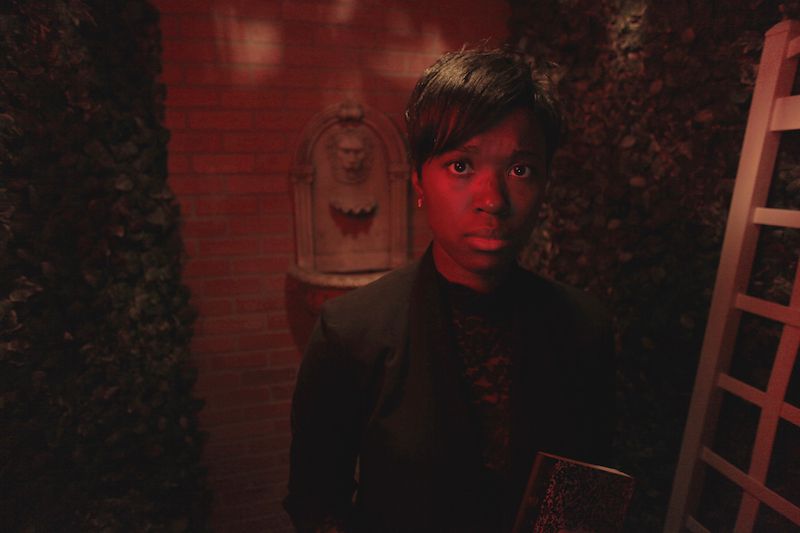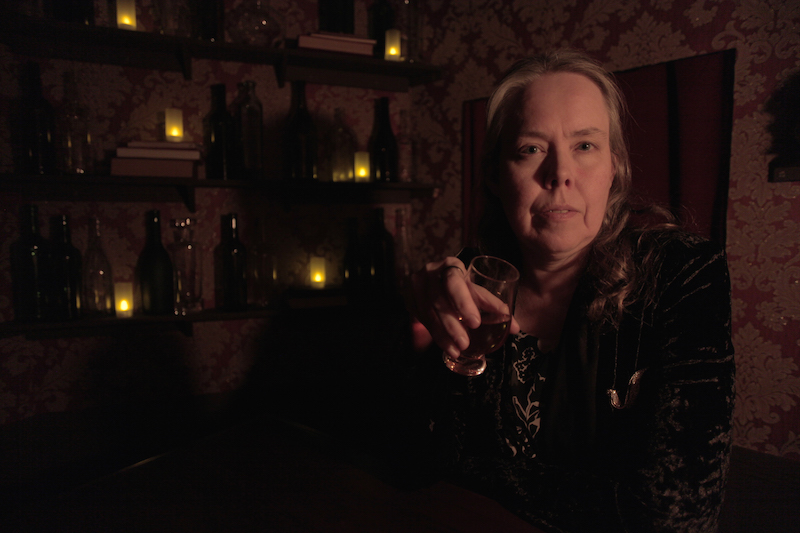
Bitter at the End is an immersive play that begins at a funeral and ends in worlds beyond our own. We explore the life, death, and beyond for one woman as seen through the seven people she touched the most. It’s both heartwarming and bleak—for them and for the audience.
If you know me, you know that I really love immersive theater and frequently attend interactive shows. In 2017, I found it difficult to top E3W Production’s In Another Room. The desolate ghost story took place in a Harvard Heights home, each room haunted by a different apparition from another era. It became clear that there was something wrong with the house, and that even those who escaped with their lives were forever cursed. That same hopelessness creeps into E3W’s sophomore effort in the immersive space, Bitter at the End.
Guests are admitted seven at a time and are asked to dress in funeral-appropriate attire. So, at about 7:30 p.m., we stand somber-suited outside a nondescript venue in Mid-City, waiting for the show to begin. Soon, a door opens and a man who introduces himself as Kevin ushers us inside.
Here, we get our first glimpse of the dearly departed, Grace. She lies still in an unusual glass casket, looking more like Sleeping Beauty than a corpse. We join seven mourners, including her estranged husband, her sobbing mother, her glowering niece, and a complete stranger who has, somehow, been deeply affected by Grace. Their loose lips paint a picture of how Grace died, and more importantly, how she had lived. She was a talented music teacher and a mother. She was loved, but not without complications.

Though this first scene may feel a bit long and expository for someone accustomed to immersive theater, don’t worry. The bare bones church soon gives way to deeper dimensions. Our group is split in the afterlife, each of us taken away one at a time by the mourners. Each one exists in their own sort of Purgatory, a moment where their lives had intersected with Grace’s. This Purgatory is both figurative and literal: each character exists in their own chamber, and all seven of them are quite different. Only one audience member is invited into a character’s chamber at a time, allowing for several intimate, one-on-one scenes. The set design is strong here, both dark and dreamy, each chamber feeling transportive despite being the size of an elevator.
I spent the most time here with Becky (Terra Strong), whose connection to Grace is neither romantic nor familiar, but is particularly interesting. Fred Cross shines as Mike, Grace’s jaded, unsatisfied brother, while Dan Dorff’s Elliot—Grace’s listless, but sensitive son—tugs at the heartstrings.
Though many shows that deal with the fallout of death are full of dulcet platitudes about embracing life and how memories keep the dead alive in our hearts, this show paints a grayer world. You won’t find a single cross stitched “live, laugh, love” in any of the four distinct chapters. When we finally hear from Grace in her own words, there’s an acerbic quality to our encounter that calls to mind the show’s title. It’s called “Bitter at the End,” after all, not Happily Ever After. Yet there is something cathartic about the show’s final scenes, in which you recognize that you are alive, for now, and there’s still time to impact those close to you, even if you haven’t met them yet.
Bitter at the End is about an hour long. Guests should be prepared to walk, sit, stand, and climb a short flight of stairs. Tickets are $70, and are available online here.
Juliet Bennett Rylah is the Editor in Chief of We Like L.A. Before that, she was a senior editor with LAist and a freelancer for outlets including The Hollywood Reporter, Playboy, Los Angeles Magazine, IGN, Nerdist, Thrillist, Vice, and others.


